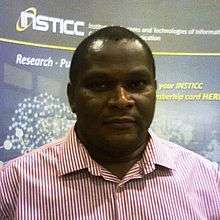Olivier Rukundo
| Olivier Rukundo | |
|---|---|
 Lisbon, January 2014 | |
| Born |
Olivier Rukundo December 1, 1981 Southern Province RWANDA |
| Occupation | Researcher |
Olivier Rukundo is one of three Rwandans going with the Sakharov Prize nominee Mrs. Victoire Ingabire Umuhoza to Rwanda in January 2010.[1][2][3][4][5][6] Olivier returned to China three weeks later to complete his Doctor of Philosophy degree program[7] at Huazhong University of Science and Technology.[8][9][10][11]
Early life and career
Rukundo was born and raised Roman Catholic in Rwanda. He attended Kigali Institute of Science and Technology, earned a degree in electronics and telecommunication engineering (2005) and he was employed for 18 months at Société Interbancaire de Monétique et de Télécompensation au Rwanda before moving on to Huazhong University of Science and Technology for his master's and PhD degrees in electronics and information engineering with a specialization in communication and information systems (2007 - 2012).[12] Dr Rukundo joined the University of Pretoria, Tilburg University and Ghent University, as a Postdoctoral Research Fellow, in 2013, 2014 and 2015, respectively.[13][14][15] His research interests to date include image processing and optimization. Dr. Rukundo served as a reviewer for several journals,[16][17][18] including the SPIE Journal of Electronic Imaging.[19]
Personal life
In an August 11, 1997 secretive night-time military operation, Gabon returned Olivier Rukundo to his homeland forcedly. Olivier fled to Gabon in June 1997 after trekking for 6 months across the equatorial forest of the Democratic Republic of Congo (former Zaire) and later fleeing fierce fighting in Brazzaville.[20]
PhD dissertation
Publications
- 2016. Advances on Image Interpolation based on Ant Colony Algorithm. SpringerPlus
- 2015. Effects of Improved-Floor Function on the Accuracy of Bilinear Interpolation Algorithm. Computer and Information Science
- 2015. Thinning based Antialiasing Approach for Visual Saliency of Digital Images. SCITEPRESS Digital Library
- 2014. Optimization of Image Interpolation Based On Nearest Neighbour Algorithm. SCITEPRESS Digital Library
- 2012. Nearest Neighbor Value Interpolation.
- 2012. Optimization of Bilinear Interpolation Based On Ant Colony Algorithm. Springer Science+Business Media
- 2011. Image Interpolation Based On the Pixel Value Corresponding To The Smallest Absolute Difference. IEEE
- 2010. Optimization of Analog Circuits Test Mode Based On Ants Colony Algorithms. IEEE
References
- ↑ "The Sunday Times". Retrieved January 17, 2010.
- ↑ "RWANDAINFO". Retrieved April 4, 2010.
- ↑ "YOUTUBE". Retrieved January 16, 2010.
- ↑ "FDU Official Website". Retrieved October 13, 2011.
- ↑ "SAR". Retrieved September 25, 2012.
- ↑ "EUROPEAN PARLIAMENT" (PDF). Retrieved September 13, 2012.
- ↑ "China National Knowledge Infrastructure". Retrieved May 30, 2010.
- ↑ "ISHEMA Newspaper". Retrieved May 19, 2011.
- ↑ "VERITASINFO". Retrieved December 28, 2010.
- ↑ "JAMBONEWS". Retrieved January 2, 2011.
- ↑ "THEPROXYLAKE". Retrieved December 28, 2010.
- ↑ "ZL50 Digital Library". Retrieved May 30, 2010.
- ↑ "University of Pretoria". Retrieved January 4, 2014.
- ↑ "Tilburg University". Retrieved January 5, 2015.
- ↑ "Ghent University". Retrieved November 3, 2015.
- ↑ "CT&IT2013". Retrieved September 15, 2012.
- ↑ "CISME". Retrieved September 15, 2012.
- ↑ "CIS". Retrieved October 9, 2015.
- ↑ "Journal of Electronic Imaging". Retrieved December 2, 2012.
- ↑ "UNHCR Official Website". Retrieved August 12, 2011.
- ↑ "China National Knowledge Infrastructure". Retrieved May 9, 2012.
- ↑ "China's Outstanding Doctoral Dissertations". Retrieved January 13, 2013.
- ↑ "China Knowledge Resource Integrated Databases". Retrieved March 26, 2013.